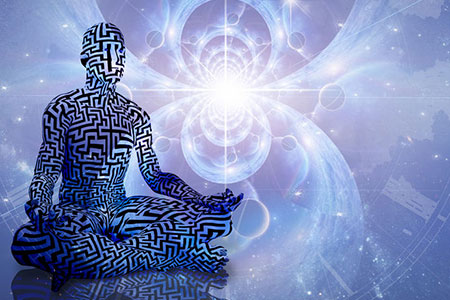Intuition
Astrological Forecast November 23 – 29, 2020
 The only significant astrological event on the agenda this week is Neptune turning direct on Saturday, after a five month retrograde cycle. Since it’s a subtle aspect, it should pass almost unnoticed! Although Neptune is a karmic planet that tends to move in the background, it has a higher purpose to direct us spiritually, allowing us to connect with our higher self, as well as our magical powers. As it shifts direction, this is a wonderful time to explore our intuitive, psychic and mystical gifts.
The only significant astrological event on the agenda this week is Neptune turning direct on Saturday, after a five month retrograde cycle. Since it’s a subtle aspect, it should pass almost unnoticed! Although Neptune is a karmic planet that tends to move in the background, it has a higher purpose to direct us spiritually, allowing us to connect with our higher self, as well as our magical powers. As it shifts direction, this is a wonderful time to explore our intuitive, psychic and mystical gifts.
It may feel like we’re running in circles under today’s Pisces Moon, but as it grounds itself in Aries tomorrow, we’ll have three days to gather our wits about us, and prepare for Thanksgiving and the holiday weekend. We’ll greet the traditional ‘Black Friday’ shopping rush under a Taurus Moon, which bodes well for finding great bargains or regrouping after over-doing it on Thursday.
Our best bet this weekend is to focus on intellectual and social pursuits, as the Neptune shift on Saturday and the Gemini Moon on Sunday encourages thinking and dreaming big!
Adaptability Is The Key To Manifesting Your Best Life
 A life lesson most often learned the hard way, is how important adaptability is to our prosperity, happiness and well-being. Adaptability is a skill that must be learned by all of us. For once you are open to this path, your world will open up in ways you never could have previously imagined!
A life lesson most often learned the hard way, is how important adaptability is to our prosperity, happiness and well-being. Adaptability is a skill that must be learned by all of us. For once you are open to this path, your world will open up in ways you never could have previously imagined!
We are all born with the capability to be adaptable. Without this, we would not be able to function effectively in this physical world. In primitive times we had to adapt to the changing seasons, extreme climates, the scarcity of food, health challenges and other challenges of human survival and evolution.
What I find most intriguing about adaptability, is that we can consciously decide to be open to adapting at any time. We simply need to open up to the Universe and all the opportunities it has to offer. It’s as simple as looking out for opportunities around us to try new things, meet new people, explore new ideas and experiences.
It can be painful at first, as it requires stepping out of your comfort zone, but it gets easier the more you do it. Look at it this way: when you choose to start working out, your muscles will change over time, because they are dealing with new, unexpected demands and are becoming better at what you are requiring it to do. Eventually it becomes second nature and you become stronger. The same thing happens when you open your mind to new thought processes, new ideas, new ways of thinking.
Being adaptable means that you have the courage and enthusiasm to go beyond your comfort zone, and experiment with what the Universe is trying to direct you through. It can be as simple as deciding to finally stop and grab food at an Indian restaurant you pass daily. You may have never tried Indian food before, but it kept catching your eye. When you are adaptable, and open to the signs of spirit coming in, you will embrace such an opportunity to try something new. Continue reading
Astrological Forecast November 16 – 22, 2020
 The Sun will complete its cycle through Scorpio this week, moving into Sagittarius on Saturday, and kicking off the official start of the holiday season. The Moon travels through Sagittarius on Monday, then enters Capricorn on Tuesday, where it will remain until Thursday. This will create one of the most productive weeks we’ve had in a while, and since Thanksgiving is next week in the United States, and the holiday season will kick in right after that, this is the week to get all that unfinished work and overdue projects completed, or at least advanced to a level where it feels manageable through the end of the year.
The Sun will complete its cycle through Scorpio this week, moving into Sagittarius on Saturday, and kicking off the official start of the holiday season. The Moon travels through Sagittarius on Monday, then enters Capricorn on Tuesday, where it will remain until Thursday. This will create one of the most productive weeks we’ve had in a while, and since Thanksgiving is next week in the United States, and the holiday season will kick in right after that, this is the week to get all that unfinished work and overdue projects completed, or at least advanced to a level where it feels manageable through the end of the year.
The Aquarius Moon will take us into the weekend, urging us to prepare for the social activities ahead. If you’re planning a big holiday dinner, double-check to make sure you’ve invited everyone you want there, and if you’re aiming for a more quiet, peaceful and calorie-light day off, this is the time to set that into motion as well. Doing things differently is a theme of Aquarius, so if you’re ready to start a new holiday tradition, or ignore tradition altogether, you can still work an attitude and sense of gratitude into your world.
Venus will move into Scorpio on Saturday, adding to the spiritual tone of the weekend. And with the Moon moving into Pisces on Sunday, it will be easy to hear what your intuition is telling you. Listening to your gut will take you exactly where you want to go!
Tapping Into Your Own Psychic Ability
 Have you ever heard your name, when no one else is in the room with you? Have you ever thought of someone unexpectedly, and have that person then suddenly show up a in person, or with a phone call, a text?
Have you ever heard your name, when no one else is in the room with you? Have you ever thought of someone unexpectedly, and have that person then suddenly show up a in person, or with a phone call, a text?
Have you ever had that eerie feeling in your gut, just knowing that something bad was about to happen? Have you ever spontaneously known the answer to a question that you were not supposed to know?
All these things are related to your intuition, or innate psychic ability. Every person has some level of psychic ability. We are all using it daily, but many are not consciously aware of it. Learning to tap into your psychic intuition more consciously is not too difficult, as long as you learn to trust where it is coming from.
Do this simple experiment. Just take a moment to ask a question. Sit quietly, close your eyes, and focus on your breathing. Then ask your question. Just one simple question. It can even be something you already know the answer to. Start with something like, “Is my name (fill in the blank).”
Relax and sense the answer. Do you feel the ‘yes?’ Typically, you might feel it in your gut (solar plexus), or in the area of your heart. It will not come from your brain, or your mind. It will be a sense or a feeling, not a thought. Of course, your mind already knows the answer, but you want to feel a resounding yes coming from your gut.
If you don’t feel it right away, that’s okay. Take the time to do it again later. Never move onto another question until you have sensed that knowing ‘yes’ from the first one. It takes practice and patience to get your energies in alignment.
When you finally do get that gut ‘yes’, then move onto another question. Initially it is best to stick with simple ‘yes’ or ‘no’ questions, that you already know the answers to, until you feel each answer coming from deep within. Do this quietly and slowly. It’s not a race or contest.
Love At First Sight Is A Spiritual Experience
 Do you believe in love at first sight? I do. I believe that you can meet someone for the first time and instantly fall in love with them. It makes complete sense from a spiritual or metaphysical perspective. We are after all energetic beings having a physical experience, so of course our souls can recognize each other.
Do you believe in love at first sight? I do. I believe that you can meet someone for the first time and instantly fall in love with them. It makes complete sense from a spiritual or metaphysical perspective. We are after all energetic beings having a physical experience, so of course our souls can recognize each other.
Some folks are convinced love at first sight is nothing more than just ‘lust at first sight,’ because love and lust are closely related in many people’s life experience. I am sure in some cases it can be both love and list, but in most instances it is not. And even lust at first sight can very quickly turn into love when there is an underlying soulmate connection.
Truth is, love at first sight is a reality for many people all over the world, simply because of their own personal experiences. And often these couples stay together for a lifetime. This may be hard to believe for some of us, who might have been less fortunate in love and romance, but it does happen more often than you may think.
How do you know when it is love at first sight? You may be surprised to know that some of the confirmation can often be found in the gut-brain connection. Your inner guidance system will always tell you when you have encountered someone special and meaningful. Your intuitive reaction to the other person will often be supported by a physical sensation. For example, you may feel a little queasy when you meet, or feel a sense of having ‘butterflies.’ There are also other physical signs that you are deeply attracted to someone at first sight, such as your heart racing, nervousness, and perhaps that goofy smile that will not leave your face!
Spiritual Ascension 2020
 When we experience a big shift or breakthrough, it will often feel like our lives are falling apart in order for something greater to manifest. The year 2020 is a prime example of this. It continues to be an extreme year on all levels, and it has truly been testing our inner and outer world.
When we experience a big shift or breakthrough, it will often feel like our lives are falling apart in order for something greater to manifest. The year 2020 is a prime example of this. It continues to be an extreme year on all levels, and it has truly been testing our inner and outer world.
I believe there is a spiritual reason for all of this. We are shifting into the Age of Aquarius. Our purpose, spiritual connection, relationships, and physical bodies are in the midst of a major spiritual awakening that feels like an intense storm or crisis for many of us.
We are now becoming more aware of the people, places and circumstances that no longer serve us. It is an opportunity to strengthen our intuition and re-calibrate our inner compass.
Emotions are also running high this year, since we are constantly being triggered, but it’s happening to get us in touch with who we really are as spiritual beings, and to help us navigate through the fears connected to our past traumas.
It is meant to integrate the light and dark aspects within each of us, and to embrace it wholeheartedly, without caring what other people may think.
You may also have been noticing certain ascension symptoms. For example, your body no longer wants certain foods, and substances, so be sure to cut back on anything that makes you tired or irritable, or causes you physical discomfort. Drink lots of water, keep a health journal, get some exercise, and eat a healthy, wholesome diet. It will help you be more calm and mindful during these demanding times.
There will continue to be days of anxiety, anger, impatience and frustration, so be sure to acknowledge when any such negative emotions surface, so you can find a moment to breathe and re-direct your energy into something that helps you find greater peace of mind.
Harmonizing The Energy Flow Of Money
 When I was younger, I never thought of money as being spiritual or metaphysical in any way. I never considered the possibility that our financial prosperity, or lack thereof, may be somehow connected to our thoughts, feelings and beliefs about it. Even after studying business, and working as an accountant for many years, I never saw the correlation. It wasn’t until I began to explore the spiritual aspect of my life, that I became aware of this link.
When I was younger, I never thought of money as being spiritual or metaphysical in any way. I never considered the possibility that our financial prosperity, or lack thereof, may be somehow connected to our thoughts, feelings and beliefs about it. Even after studying business, and working as an accountant for many years, I never saw the correlation. It wasn’t until I began to explore the spiritual aspect of my life, that I became aware of this link.
I became the sole income provider in my home, after my divorce. At this time, I began to look more deeply into my beliefs and associations with money. If you personally relate to my experience during those difficult days, you will also understand what it feels like to be totally overwhelmed when you are experiencing many new obstacles in your life to financial security and cash flow.
Fortunately, there has always been a logical and practical part of myself that kicks in when I’m faced with big challenges and difficult choices, especially around financial decisions. This instinctive part of me is a natural default from my years as an accountant and mortgage finance consultant.
When my inner accountant comes out, I look at the logical side of things and rationally reason my decisions. Then, on other occasions, the spiritually aware, intuitive part of me knows that if I am overly stressed and worried about money, I block my own energy flow from the Source of all things abundant. I have often also seen that my creative process and artwork doesn’t flow freely when I become too worried about finances – I just paint ‘mud.’
So, how do we find balance between our logical, human need for material security, and the intuitive, spiritual aspect of our soul that finds it easy to trust the unknown? How do we find that balance?